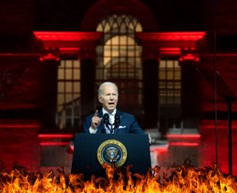AUDIO NOTE: It’s a long post, today, and therefore a long audio. To save myself some time I did most of it in one take. It’s therefore bubbling over with mispronunciations, self-corrections, improvised riffs, and random musings that aren’t found in the text below. So it’s messy but fun. All you lurkers who come around and never comment, how about helping with a little feedback? I ain’t gonna get any better just listening to myself…
The very fine, very smart people at DanmarksRadio (DR) are looking at America and they don’t like what they see:
The Un-united States: America is divided into two camps that hate each other
Jakob Busk Olsen, DR.dk, November 4
Here’s how the article opens:
Is civil war breaking out in the United States?
The question may sound far-fetched. But it is nevertheless one that is being discussed extensively in American newspapers and on social media such as Twitter here in the run up to the November 8 mid-term elections.
I removed the links from the citation but left them underlined. The first link goes to this opinion piece in the Iowa Gazette, the second to a month-old New York Times article: “After Mar-a-Lago Search, Talk of ‘Civil War’ is Flaring Online.”
Quick answer to Jakob Busk Olsen’s opening question: No, civil war is not breaking out in the United States.
The question is perhaps being discussed quite seriously on the opinion pages of newspapers like the Iowa Gazette, whose home page on Saturday evening looked like this:

Civil war talk is also surely prominent in the feverish imaginations of NYT reporters on the Twitter beat, but that doesn’t make it any less far-fetched.
Many Americans can easily imagine it. In several studies, close to half of the respondents say that a civil war is likely in the near future.
Some commentators even believe that the war has already begun. There is also an extensive page on Wikipedia about the second American Civil War.
The first of those three links, the one to “several studies,” goes to a two-month old Grauniad article entitled “More than 40% of Americans think civil war likely within a decade.” The Guardian does indeed cite from studies that make that point, although it’s probably worth mentioning that those particular surveys were taken just two weeks after a former president’s private residence had been raided by a current president’s FBI for the first time in American history.
The Guardian also neglects to mention that the main study in question found that most Americans believed things had gotten worse since a very specific point in time:
Two-thirds of Americans (66%) believe that political divisions in this country have gotten worse since the beginning of 2021, compared to only 8% who say the country has grown less divided. Few see things improving in the coming years: 62% expect an increase in political divisions.
A similar share (63%) to the proportion who say political divisions have worsened (66%) say political violence has increased since the start of 2021. Three in five Americans (60%) anticipate an increase in political violence in the next few years and only 9% expect political violence to decline.
“Since the beginning of 2021” is an awfully roundabout way of saying “since Joe Biden became president” or “since Democrats took control of the White House and Congress.”
The second link in the DR citation, “war has already begun,” goes to another Guardian article, this one an opinion piece by the malignant socialist Robert Reich. It’s entitled “The second American civil war is already happening,” and it’s from May 2022—six full months ago.
As the odious Reich writes in just the second paragraph:
The second American civil war is already occurring, but it is less of a war than a kind of benign separation analogous to unhappily married people who don’t want to go through the trauma of a formal divorce.
So the civil war was already underway six months ago and by the way it’s nothing at all like a war.
The third of the three links goes to a Wikepedia article entitled “Second American Civil War.”
Good old Wikipedia: a voice of reason and sanity, a beacon of objective truth.
In fairness to Wikepedia, however, even their article opens up pretty generically:
The “Second American Civil War” is an umbrella term used by academics in order to reclassify historical eras of significant political violence in the history of the United States as a “civil war” or, more commonly, to discuss the potential outbreak of a future civil war in the country. Discussion of a second civil war has occurred with varying degrees of frequency and sincerity since the first civil war ended in 1865.
Exactly: it’s a lot like the so-called “second coming” in the sense that it’s often announced and always postponed.
At this point in the DR article, we’re treated to an inset explainer, which I cite in its entirety:
Why the midterm elections are important
On November 8, voters in the United States go to the midterm elections. These fall halfway into the sitting president’s term of office and determine, among other things, the balance of power in Congress.Currently, President Joe Biden’s party, the Democrats, has the majority in both houses of Congress. If the opposition Republicans gain a majority in just one of the two chambers, they could cripple Biden’s political agenda.
The midterm election is also the first national election in the United States since the 2020 presidential election that led to the storm in Congress on January 6, 2021, and the result of which a majority of Republican voters still do not recognize. The election will therefore be a decisive test for American democracy itself, which around 70 percent of voters believe is threatened.
Quite the explanation! The midterms are important because if even just one chamber of Congress falls under Republican control, it could “cripple” the president’s political agenda. Anybody care to place a wager on whether DR expressed any concern about the 2018 midterms possibly “crippling” Donald Trump’s political agenda?
Here’s what’s happened in new presidents’ first first midterm elections going back to 1982:
- 2018: Donald Trump’s Republicans lost 41 seats and the majority in the House, but added two seats to their Senate majority.
- 2010: Barack Obama’s Democrats lost 63 seats and the majority in the House and lost six seats in the Senate but held on to the majority.
- 2002: George W. Bush’s Republicans gained 8 seats to expand their majority in the House and gained 2 seats in the Senate, thereby taking the majority.
- 1994: Bill Clinton’s Democrat’s lost 54 seats and the majority in the House, and lost 10 seats and the majority in the Senate.
- 1990: George H.W. Bush’s Republicans lost 8 House seats, keeping them in the minority, and lost one seat in the Senate, where they were also already in the minority.
- 1982: Ronald Reagan’s Republicans lost 26 seats in the House, where they were already a minority, and broke even in the Senate, where they had a majority.
The trend goes back further than that, but suffice to say that with the exception of George W. Bush (whose midterms were obviously colored by the 9/11 attacks of the previous autumn), the midterms of every American president’s first term in the modern era have produced huge setbacks to the president’s party in Congress.
In other words, every American president’s agenda is “crippled,” as DR phrases it, in their first midterms. There’s nothing unusual about it—it is, in fact, the usual thing.
These midterms are also important, according to DR, as a “test” for American democracy, because seven out of ten voters think democracy is threatened.
No link is provided to back that claim up, although I have no doubt DR could have provided one. I’ll go ahead and share the results they didn’t:
The poll details released Tuesday showed that a whopping 71% of the 792 registered voters questioned say “American democracy is currently under threat.”
Among those who fear for democracy, 84% of them, or roughly 60% of all registered voters, view “mainstream media” as some sort of threat. A majority, 59%, call the media a “major threat to democracy” while an additional 25% call it a “minor threat to democracy.” Only 15% who say democracy is under threat do not blame the media.
Ah, you may be thinking, but that’s from Fox News, and therefore disinformation!
Whoopsie—I forgot to include the first paragraph (emphasis mine):
Stunning data from a New York Times/Siena poll find the majority of registered voters believe the media is a “threat” to democracy.
A little more from that New York Times poll:
Among those who say democracy is under threat, the media outranks Donald Trump, Joe Biden, Republicans, Democrats, the Supreme Court, the Electoral College, voting by mail and voting machines as being a major threat to democracy.
67% of those registered voters collectively view Trump as a threat to democracy and 84% of those Democrats called the former president a “major threat.” 60% of those registered voters collectively said the same thing about Biden with 78% of those Republicans calling the current president a “major threat.”
70% of those Independents view Trump as some sort of threat to democracy while 62% of them felt the same about Biden.
A reasonable interpretation of these results would be that Americans on the left and right see each other as threats to democracy, but the majority of all Americans see the media as a threat to democracy.
And this DR article, representative as it is of establishment journalism across the western world, is a pretty good example of why.
The rest of the DR article quite predictably zooms in on the many ways in which Republicans are fomenting political violence, questioning the legitimacy of elections, etc—while completely ignoring the ways in which Democrats have done (and are doing) exactly the same thing, often on an even larger scale.
And, I might add, more successfully.
So I’m going to ignore all that because Forget it, Jake, it’s DR. (Here’s an American with a refresher course on recent political violence from the left—but we’ll look at many of the examples he cites later in this post. For a refresher on how the left has been questioning the legitimacy of elections, I cite All Establishment Media Output, 2016-2020, op. cit.)
Instead, I’d like to zoom in on yet another “explainer” DR has inset within this article, this one from the execrable Kretz:
LIGHTNING ANALYSIS
By DR’s USA correspondent Steffen KretzNo matter how you look at it, these years the United States is a political pressure cooker that threatens to boil over.
The pressure increased considerably during the four years of Donald Trump as president. His constant verbal attacks on anyone he saw as an adversary or simply not a loyal enough party member changed the tone of politics and pushed the boundaries of what one could indulge. Trump’s lie about election fraud has similarly changed the Republican Party since 2020, so that today it bears more of a personality cult than an ideologically based political party: Either you are loyal to Trump and his election lie, or you are an enemy of America.
But the Republican demonization of the leaders of the Democratic Party started long before Trump. It has been going on for decades and is being reinforced in a media ecosystem around the television station Fox News. In this warped universe, President Barack Obama was born in Africa and had cheated his way into office. Hillary Clinton runs a pedophile ring out of a pizzeria, and Joe Biden only won by fraud. The claims are absurd, but are circulated endlessly on social media, and about a third of Americans firmly believe in the conspiracy theories.
The us-versus-them narrative is used to excite the voter base and get more of the party’s voters to vote. That the narrative can lead to violence, there are countless examples of – most recently last week’s attack on the spouse of the top figure in the Democratic Party, Nancy Pelosi, in their home in San Francisco.
That’s fair, balanced, objective, and concise. Scholarly and informative.
In Bizarro world.
Here on planet earth, it’s hard to imagine how much more bias Kretz could have woven into those four little paragraphs.
I’m going to dismantle the whole hateful edifice he’s constructed, but let’s begin with one “consensus fact” that’s endlessly repeated on the left despite the fact that it has no basis in reality and makes no logical sense anyway.
That’s the notion the American right is entirely controlled by Fox News (or even “the media ecosystem around” it), which is itself controlled by the demonic forces serving the Dark Lord of Mordor.
The left has been spewing this idiocy for decades.
But here’s the thing: only about 2.1 million Americans watch Fox News during prime time (the most-watched period of the day, from 20:00 to 23:00). That’s certainly more than the 1.3 million who watch MSNBC or the 731,000 who watch CNN. Of the 2.1 million Americans watching Fox News in prime time, only 194,000 are in the coveted 25-54 year old bracket. (CNN has 110,000, and MSNBC has only 84,000.)
Fox’s viewership isn’t even 3% of the number of people who voted for Donald Trump in 2020.
Certainly Fox News is slaying the other cable news channels, but the idea that Fox News is the driving force behind the thinking of the American right is and always has been laughable.
What’s more, Kretz specifically says that several insane beliefs are rampant on Fox News—without providing a single link to any of them. I’d like to see a link to a Fox news segment claiming that Obama was born in Africa or cheated his way into office, or stating that Hillary Clinton was running a “pedophile ring” anywhere, much less a pizzeria, or that Joe Biden “only won by fraud.”
Those are very specific claims and Kretz should back them up. But he can’t, because he’s mixing up ridiculous memes from the fever swamps of the internet with actual news reportage on a cable channel. He’s mixing them up because he gets all his information from the warped universe of American leftwing extremists.
So let’s put to bed this whole idiotic notion that Fox News is a driver of conservative American thinking rather than a reflection of it. Rupert Murdoch saw an underserved market niche, directed some programming at it, and laughed his way to the bank. (Exactly what Microsoft and NBC tried to do with MSNBC, except they’re not laughing as hard or going to the bank as often.)
With that behind us, let’s turn our attention to the last paragraph: “The us-versus-them narrative is used to excite the voter base and get more of the party’s voters to vote. That the narrative can lead to violence, there are countless examples of…”
Truncated like that, Kretz could be writing about the Democratic Party under Joe Biden.
You wan’t an “us-versus-them narrative” being exploited to “excite the voter base?” Try this on for size:

Joe Biden and the Democrats are out there every day pushing an us-versus-them narrative so hard they’re going to end up with a collective hernia. And here’s Steffen Kretz doing the very same thing: whipping up anti-Republican hysteria among Danish readers for no good reason I can think of other than he’s either a gullible leftwing idiot or a malevolent leftwing propagandist.
Note that he uses the attack of an insane, BLM-supporting Berkeley nudist on Nancy Pelosi’s husband as evidence that “the narrative can lead to violence.”
Narrative can lead to violence, you say?
Interesting.
I notice DR hasn’t covered the story of Cayler Ellingson, an 18-year-old who was deliberately murdered by the 41-year-old Shannon Brandt for avowedly political reasons.
From the Washington Examiner:
From the moment Brandt called 911 after allegedly hitting Ellingson with his car, “Brandt made comments regarding the incident being intentional and not an accident,” according to the affidavit. At one point, he asked the dispatcher if he would go to prison. During his interactions with investigating officers, Brandt claimed Ellingson was part of a “Republican extremist group.”
However, North Dakota Highway Patrol Capt. Bryan Niewind said that after interviewing witnesses at the scene and those who knew Ellingson, there was “no evidence to support Brandt’s claim on the 911 call that Mr. Ellingson was a Republican extremist.”
It’s okay, officer, I only used my SUV to kill him because he was a member of a Republican extremist group.
Who in the blue blazes thinks it’s okay to murder people with an SUV because of their politics? What kind of—

Oh… right, Darrell Brooks. Forgot about him.
Probably forgot about him because I hardly ever hear about him.
Of course, political violence doesn’t require an SUV. Enterprising youngster Nicholas Roske “traveled to (Supreme Court Justice Brett) Kavanaugh’s home with a pistol, extra ammunition, a tactical knife and other gear.”
Thankfully Roske chickened out at the very last minute, but not every would-be assassin with a gun does: 66-year-old “Bernie Bro” James Hodgkinson, you may remember, shot six people at a Republican baseball team practice. According to the Virginia Attorney General, it was “an act of terrorism… fueled by rage against Republican legislators.”
If Steffen Kretz is so damn sure that the mentally infirm David Pape’s assault on Paul Pelosi was the result of Republican rhetoric, don’t you think these cases—and so many others like them—might warrant an inch or two of column space, and perhaps some musings on the consequences of Democratic rhetoric?
I know, I know, that’s crazy talk.
But Kretz does another bit of rhetorical sleight of hand in his explainer. He notes that “The (political) pressure increased considerably during the four years of Donald Trump as president,” which is certainly true—except he places the blame entirely and exclusively on Donald Trump.
He says, for example, that Trump’s verbal attacks “changed the tone of politics and pushed the boundaries” of acceptable political discourse.
I’m not willing to concede that point unconditionally, but it’s reasonable to say that Trump’s public use of invective broke some new ground. Trump’s novelty was in his saying publicly what most presidents (and presidential candidates) said only privately. For many of his supporters that was part of his charm: you didn’t have to agree with Trump, but you always knew exactly where he stood—although even his supporters sometimes found themselves wincing at his more inelegant verbal formulations.
The idea that “either you’re loyal to Trump and his election lie or you’re an enemy of America,” however, is itself the Big Lie of the 2022 election cycle.
The political polarization that occurred in America during Trump’s presidency was almost entirely a consequence of the establishment’s decision—made long before Trump was even elected—to completely denormalize and delegitimize first Donald Trump himself and then his supporters.
Anyone lucid enough to remember 2016 knows that once he became the Republican nominee, all hell broke loose. Not from Trump and his supporters, but from the establishment that opposed him. Trump was a novel candidate, absolutely. But the really unprecedented thing about his candidacy and presidency wasn’t anything he himself said or did—quick: name three things he said or did that no other American president or candidate had said or done before him. What was entirely unprecedented were the things his political opponents and the media said and did.
Quick: name three other presidential candidates the New York Times declared so out of bounds that they couldn’t (and wouldn’t) be written about objectively. Name three other presidents-elect whom the opposition began publicly trying to disqualify from office before they were even inaugurated. Name three other presidents whom the opposition promised to impeach before they’d even taken office. Name three other presidents whose opposition declared themselves “the resistance.” Name three other moments in American history in which civil service employees who worked actively to thwart administration policies were lionized as heroes by the establishment media of the day.
Trump was certainly an unusual president and there was plenty to dislike about him. But the same can be said about every American president. Each was unique, and all of them had plenty of vices to go along with their virtues. It’s an interesting exercise to reflect on just how pressured and polarized the four years of his presidency might have been had the Democratic party and their media enablers not gone so far overboard in their opposition.
That’s not how Steffen Kretz sees it, however. That’s not how anyone on the left sees it. They dialed things up to eleven against Trump and, perversely, against his supporters—their fellow Americans, their colleagues and neighbors, their friends and families—in an absolutely unprecedented fashion, and then turn around and blame Trump for being so divisive.
They wrote off half the country as racist, homophobic, and misogynist—as deplorable bigots. They sought to publicly shame and punish people for the impudence of supporting a president they opposed. And they can’t understand why the country is so divided.
Why, oh why, did Trump have to divide the country so?
America’s not headed for civil war, but the left has certainly earned itself one hell of a thrashing this Tuesday, and the electorate appears poised to administer it.
If that’s what happens, it’ll be interesting to see how the Danish media interpret the results: will they perceive it as a rebuke to an administration that’s gone too far for the American public—or a sign that the American public itself has gone too far?
I know where I’d put my money…
